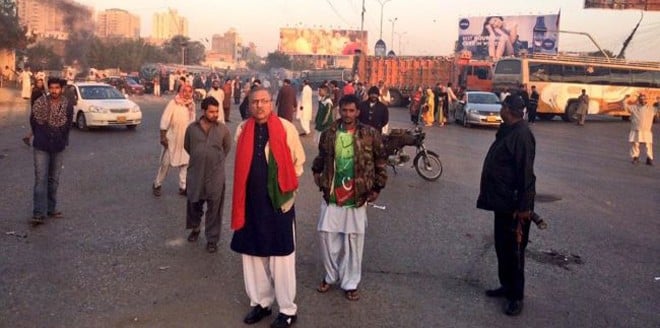
Now is the time for PTI to consolidate the gains it had made in the city in May 2013. But the challenge is to work in neighbourhoods that are different from affluent areas

After a lull of about two years, Pakistan Tehreek-e-Insaf (PTI) has again focused on Karachi. The party had enjoyed a popularity wave since late 2011 and emerged as the second largest political force in the 2013 general elections in Karachi. But it did not concentrate on the politics of the city and only focused on their claims of rigging in some constituencies of Lahore, demanding the re-elections there.
Having reached a consensus of sorts with the leadership of Pakistan Muslim League-Nawaz (PML-N) over setting up of a judicial commission to investigate the claims of rigging, the party’s supremo Imran Khan is again eyeing Karachi.
Meanwhile, the Rangers’ recent moves against Mutahida Qaumi Movement (MQM), raid on its headquarter Nine Zero and arrest of several leaders and members had given a golden opportunity for PTI to exploit the situation. Luckily for them, Nabeel Gabol, a former PPP leader who joined MQM before the general elections and had become an MNA from NA-246, resigned from his seat. A by-election in the constituency, consisting Azizabad and Liaquatabad areas from where Altaf Hussain had started his movement, has been announced.
After praising and supporting the Rangers’ acts against MQM, Khan has fielded his candidate, Imran Ismail, party’s central leader in Karachi, for the NA-246 by-election. Ismail has also started giving sweeping statements to ‘liberate’ Karachi and hold a public gathering in Karachi to ‘defeat Altaf Hussain’.
Ali Zaidi, the Karachi president of PTI, said that residents of Karachi were frustrated with ethno-political violence, targeted killings and extortion and they had shown their interest in new leadership in the last elections. "Despite the large-scale rigging, PTI has emerged as the second largest party in the city, securing votes in every pocket across the ethnic composition and neighborhoods of all classes."
Some analysts agree with Zaidi’s claims and admit that PTI, in many ways, has disturbed the political equation in the city. They believe PTI as an emerging force in the city is creating problems for other parties, especially MQM.
Laurent Gayer, a French scholar, writes in his recent book Karachi: Ordered Disorder and the struggle for the City, that "the MQM has reasons to worry: not only did the PTI become Karachi’s second party in terms of vote share (and a party which, adding insult to injury, garnered a significant number of votes from MQM traditional constituencies, unlike the PPP), but its candidates polled in second position in twenty-two provincial constituencies (out of forty-two) and fifteen (out of twenty) national constituencies."
Although PTI has only won one National Assembly and three Sindh Assembly seats in the general elections, its candidates gave a tough time to their opponents in a majority of provincial and National Assembly seats.
Background interviews with PTI leaders and political analysts suggest that the party has a strong support base in the city but it would be difficult for them to replace MQM’s street power. There are two main reasons -- weak organisational setup and lack of understanding of the political dynamics of the city.
After the 2013 general elections, the party chairman Khan largely ignored Karachi and party’s organisation itself was split into various factions. "For two years, PTI leaders in the city were fighting over the positions and till a few months ago, we had three Karachi presidents," said a party leader in Mehmoodabad area.
Abubakar Baloch, a Karachi-based journalist, said that the PTI has mass support base in each neighborhood but we do not have proper grass-root level organisation in the city. "They have focused mainly on the affluent areas of NA-250 and some Pashtun and Punjabi pockets. This is stopping the party from competing with MQM, which has an organised system of units and sectors."
Zaidi corroborated it and said that Khan has recently dissolved all organisational bodies across the country, including Karachi, on complaints of glaring irregularities in previous intra-party polls and appointed former interior secretary Tasneem Noorani a the party’s chief election commissioner.
"PTI does not do politics of Karachi. Now, when MQM is in hot water, the PTI has started focusing on Karachi after their disappearance for two years," said a librarian in Liaquatabad, who voted PTI in last elections. "Their supporters voted for PTI without knowing who the candidates from their constituency were. But PTI did not contact them after the polls."
There is a popular perception that Khan has been doing politics on the command of the establishment and that after the dharna politics against the PML-N, his new task is MQM. The by-election in NA-246, an Urdu-speakers’ majority constituency, is a test case for PTI.
Ali Arqam, a political analyst based in Karachi, believes the raid on Nine Zero, by-election and announcement of public gathering in Azizabad has made the Urdu speakers’ community skeptical and MQM has also successfully exploited the impression that the ongoing Rangers’ raids are actually part of an operation against the community.
"Now it all depends on how the PTI works in such an atmosphere as these neighbourhoods are very different from the affluent areas of the city," said Arqam.